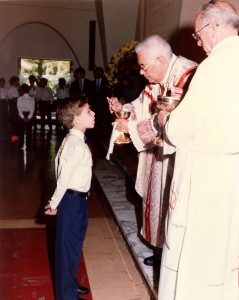 My last communion was during a brief suspension of my former church’s policy of forbidding it to children. I was already halfway out Protestantism’s door, and three-quarters out of my marriage, but on this their mother and I agreed: we should seize the opportunity to have communion alongside our children. The table was soon blocked again, after much pastoral consultation of texts. Communion remained accessible for hard-drinking adulterers like me, but not for my four year-old.
My last communion was during a brief suspension of my former church’s policy of forbidding it to children. I was already halfway out Protestantism’s door, and three-quarters out of my marriage, but on this their mother and I agreed: we should seize the opportunity to have communion alongside our children. The table was soon blocked again, after much pastoral consultation of texts. Communion remained accessible for hard-drinking adulterers like me, but not for my four year-old.
I lingered at the edges of another church in the following months, and then not at all. The shape of a newly divorced and even harder drinking man is not well-suited—at least it can seem to him, in his vanity and stupor—to pews. I drifted, and far.
My memory of that long descent’s end is the memory of a voice, nightly, over the phone. That voice spoke truths I’d forgotten apply to me: truths about forgiveness, about purpose. It was not the voice of an angel, but close enough, and to this day the sound of it conjures for me salvation.
I still hear it every morning, because it is the voice of a woman who chose to become my wife, long after I stopped believing I deserve such a thing. She took my hand despite my past, took it though her cancer left us unsure if she would live long past a honeymoon. We had no money, no home. Each of us bore a sickness. Today we are mending, and we have a house in a little town, and my children love her more than I imagined possible.
I believe in miracles. How else can a man like me wake each morning to the sound of salvation?
A friend recently asked if God abandons us. I told her I used to think so, but now I see differently. We imagine God goes missing when we craft about ourselves a hell. It is we who abandon him.
Yet all about is grace, and how foolish must the prodigal feel, to realize how long his father waited. He should take that foolishness into his heart, and run his fingers along the scars of his wandering, lest he ever be tempted to forget.
There is grace, and one such grace is that in days, my wife and I will receive Holy Chrismation in the Orthodox Church. Our priest will anoint us, and we will receive communion. After so many years, I hunger and thirst, and here is another miracle: that the table would be set for the likes of me.
Some Protestant friends are suspicious of Orthodoxy, most especially the icons. I like to remind them of the tribes that Joshua sent to live in the land of Moses, across the Jordan. They erected an altar there, to symbolize their covenant with the God of Israel. Their neighbors saw the altar, reckoned it an idol, and came bearing swords to slay the infidels. It is not for worshipping falsely, was the reply. “It is to be a witness between us and you and the generations that follow.” Not every reverenced thing is an idol, I tell my friends.
The best rebuttal Flannery O’Connor offered to bloodless rationalism is not a short story, but her famous retort to Mary McCarthy’s condescending praise of the Eucharist as a “pretty good” symbol: “Well, if it’s a symbol, to hell with it.”
To hell with McCarthy’s attitude, but perhaps not with the symbol itself. As elsewhere, our words for God’s mysteries have been denuded. The West came to think of “symbol” in the Platonic sense, as a representative of the true thing. Some Reformers saw in it only danger; best eradicate it, lest man worship the created thing, rather than his Creator. Thus did John Calvin ban throughout his dominion the tradition of coming to the communion table with one’s arms in the form of the cross.
But long before this alteration, symbolos was understood as bringing two things together. As making present the unseen. It was counterposed to diabolos: to divide. Perhaps unsurprisingly, a West that embraced the rational idea of symbol also embraced a reductionism best characterized by diabolos. How fitting that the word also means: “to make someone fall.” How fitting that it evokes the name we give to the prince of darkness.
I know about diabolos. I have been diabolos. A stumbling block in my former church, a stumbling block to my former wife, and in my divorce, a stumbling block to my children. I have been diabolos, yet in my father’s house, a banquet is prepared.
And yet. Not all things are made new, this side of the veil. Though my children come to church with me, their mother wanted them to be members of her church. The bitter irony in my return to communion is that I still cannot partake with my children; the Orthodox Church forbids it to anyone who will not forsake communion in non-Orthodox churches. My children will fare, at least for a time, without the fullness of symbolos, because their father was diabolos.
The prodigal bears his scars, as do his children. But the table awaits. It awaits me, and so surely it awaits them, when they are ready, when they can navigate yet another acre of the minefield cast before children of divorced parents.
I am tempted to wait for them, but I need the mystery, and they need me to enter into it. “There is power in the blood,” goes the old hymn. Many Christians never stopped believing that. There is power in the blood, redemption in the body, and healing in the house of God, even for someone like me.
Especially, I see now, for someone like me.
Tony Woodlief lives outside Wichita, Kansas, and is the author of a spiritual memoir, Somewhere More Holy. His essays on faith and parenting have appeared in The Wall Street Journal, The London Times, and WORLD Magazine. His short stories, two of which have been nominated for Pushcart prizes, have been published in Image and Ruminate. His website is www.tonywoodlief.com.











